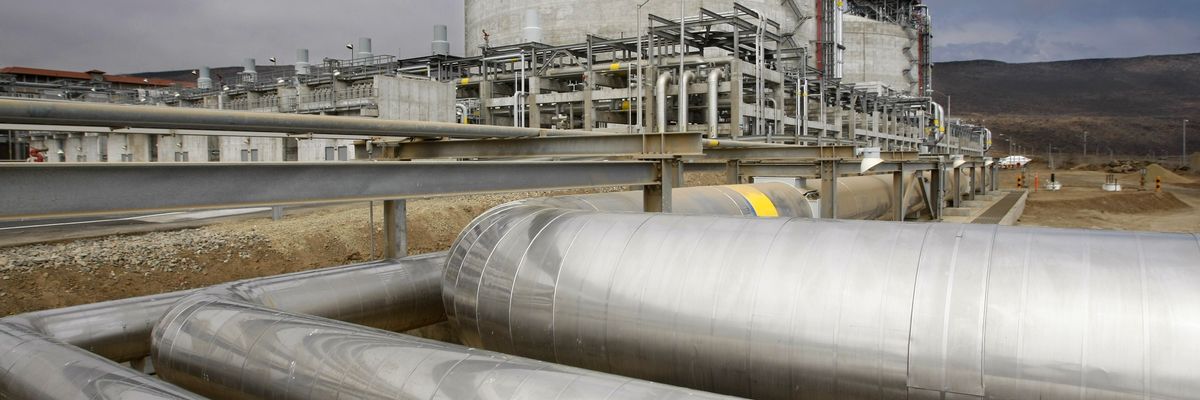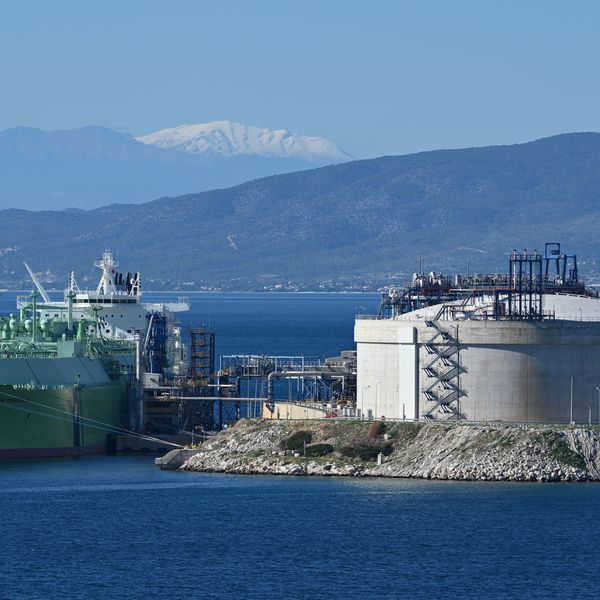
A network of insulated pipes that carry liquid natural gas from ships to giant storage tanks is seen near Ensenada, Mexico on August 28, 2008.
Despite Lofty Rhetoric at COP28, US Approves LNG Pipeline to Mexico
The U.S. State Department, said Public Citizen, "abdicated its authority" when it approved the Saguaro LNG pipeline without securing an emissions review.
Days after U.S. Secretary of State Antony Blinken addressed the 28th United Nations Climate Change Conference and warned that food insecurity "is made worse by our warming climate," government watchdog Public Citizen wrote to the top diplomat Wednesday, demanding to know why—if he is concerned about planetary heating—his agency recently approved the construction of a fracked gas pipeline.
The group was particularly perplexed by the fact that the State Department approved Oneok's Saguaro pipeline even though two weeks earlier, the Bureau of Energy Resources had ignored a request for a federally mandated emissions review for the project.
"Today Public Citizen requests that the U.S. Department of State explain why it abdicated its authority to grant a favorable recommendation for a natural gas export pipeline without first obtaining a lifecycle analysis of the project's impact on greenhouse gas emissions," wrote Tyson Slocum, director of Public Citizen's energy program. "We request a meeting with the appropriate representative to discuss."
Oneok wrote to the Federal Energy Regulatory Commission (FERC) in December 2022, requesting a presidential permit to build and operate the proposed 155-mile pipeline, which would connect the Permian Basin in West Texas to liquefied natural gas (LNG) export terminals in Mexico.
"Why did the government backtrack on a modest demand for a greenhouse gas emissions analysis for a pipeline and instead rubber-stamp a major fossil fuel project?"
FERC is required to obtain a "favorable recommendation" from the State Department before granting a permit for the construction of a pipeline that would cross a U.S. border.
But in an executive action announced in September, President Joe Biden directed agencies to consider the greenhouse gas impacts of new projects, "in environmental reviews conducted pursuant to the National Environmental Policy Act (NEPA)."
As such, Public Citizen noted in its letter, Hagen Maroney, deputy director of the State Department's Office of Global Change wrote to FERC on November 8 requesting "a greenhouse gas emissions analysis for the Saguaro pipeline project that covers lifecycle upstream and downstream greenhouse gas emissions."
Both FERC and Oneok refused to cooperate with the request, saying it was "beyond the scope" of the agency's analysis—but nevertheless, on November 13, the company and the commission were granted a favorable recommendation for the presidential permit.
As Reuters reported in June, U.S. companies were on track to approve three LNG export projects capable of processing 5.1 billion cubic feet per day (bcfd)—a record annual volume for LNG projects.
The U.S. became the largest producer of LNG in 2022, with exports expected to reach 12.1 bcfd this year and 12.7 bcfd in 2024.
"The Biden administration must explain why it is allowing a major fossil fuel export pipeline to be built, at the very moment it is traveling to global climate talks to call for ambitious climate action," said Slocum. "Why did the government backtrack on a modest demand for a greenhouse gas emissions analysis for a pipeline and instead rubber-stamp a major fossil fuel project?"
"The green light for the Saguaro pipeline project," he added, "shows yet again that the Biden administration's support for unfettered fossil fuel exports compromises its position to address the climate crisis."
An Urgent Message From Our Co-Founder
Dear Common Dreams reader, The U.S. is on a fast track to authoritarianism like nothing I've ever seen. Meanwhile, corporate news outlets are utterly capitulating to Trump, twisting their coverage to avoid drawing his ire while lining up to stuff cash in his pockets. That's why I believe that Common Dreams is doing the best and most consequential reporting that we've ever done. Our small but mighty team is a progressive reporting powerhouse, covering the news every day that the corporate media never will. Our mission has always been simple: To inform. To inspire. And to ignite change for the common good. Now here's the key piece that I want all our readers to understand: None of this would be possible without your financial support. That's not just some fundraising cliche. It's the absolute and literal truth. We don't accept corporate advertising and never will. We don't have a paywall because we don't think people should be blocked from critical news based on their ability to pay. Everything we do is funded by the donations of readers like you. Will you donate now to help power the nonprofit, independent reporting of Common Dreams? Thank you for being a vital member of our community. Together, we can keep independent journalism alive when it’s needed most. - Craig Brown, Co-founder |
Days after U.S. Secretary of State Antony Blinken addressed the 28th United Nations Climate Change Conference and warned that food insecurity "is made worse by our warming climate," government watchdog Public Citizen wrote to the top diplomat Wednesday, demanding to know why—if he is concerned about planetary heating—his agency recently approved the construction of a fracked gas pipeline.
The group was particularly perplexed by the fact that the State Department approved Oneok's Saguaro pipeline even though two weeks earlier, the Bureau of Energy Resources had ignored a request for a federally mandated emissions review for the project.
"Today Public Citizen requests that the U.S. Department of State explain why it abdicated its authority to grant a favorable recommendation for a natural gas export pipeline without first obtaining a lifecycle analysis of the project's impact on greenhouse gas emissions," wrote Tyson Slocum, director of Public Citizen's energy program. "We request a meeting with the appropriate representative to discuss."
Oneok wrote to the Federal Energy Regulatory Commission (FERC) in December 2022, requesting a presidential permit to build and operate the proposed 155-mile pipeline, which would connect the Permian Basin in West Texas to liquefied natural gas (LNG) export terminals in Mexico.
"Why did the government backtrack on a modest demand for a greenhouse gas emissions analysis for a pipeline and instead rubber-stamp a major fossil fuel project?"
FERC is required to obtain a "favorable recommendation" from the State Department before granting a permit for the construction of a pipeline that would cross a U.S. border.
But in an executive action announced in September, President Joe Biden directed agencies to consider the greenhouse gas impacts of new projects, "in environmental reviews conducted pursuant to the National Environmental Policy Act (NEPA)."
As such, Public Citizen noted in its letter, Hagen Maroney, deputy director of the State Department's Office of Global Change wrote to FERC on November 8 requesting "a greenhouse gas emissions analysis for the Saguaro pipeline project that covers lifecycle upstream and downstream greenhouse gas emissions."
Both FERC and Oneok refused to cooperate with the request, saying it was "beyond the scope" of the agency's analysis—but nevertheless, on November 13, the company and the commission were granted a favorable recommendation for the presidential permit.
As Reuters reported in June, U.S. companies were on track to approve three LNG export projects capable of processing 5.1 billion cubic feet per day (bcfd)—a record annual volume for LNG projects.
The U.S. became the largest producer of LNG in 2022, with exports expected to reach 12.1 bcfd this year and 12.7 bcfd in 2024.
"The Biden administration must explain why it is allowing a major fossil fuel export pipeline to be built, at the very moment it is traveling to global climate talks to call for ambitious climate action," said Slocum. "Why did the government backtrack on a modest demand for a greenhouse gas emissions analysis for a pipeline and instead rubber-stamp a major fossil fuel project?"
"The green light for the Saguaro pipeline project," he added, "shows yet again that the Biden administration's support for unfettered fossil fuel exports compromises its position to address the climate crisis."
- More Fracked Gas Exports Will Worsen Climate Emergency. Send Heat Pumps Instead ›
- 'A Welcome Relief': Transportation Department Suspends Trump-Era LNG 'Bomb Trains' Rule ›
- 44 Lawmakers 'Sound the Alarm' on Threat of LNG Expansion ›
- 'Alarming': FERC Ignores Climate Impacts and Rubber-Stamps Texas Pipeline ›
Days after U.S. Secretary of State Antony Blinken addressed the 28th United Nations Climate Change Conference and warned that food insecurity "is made worse by our warming climate," government watchdog Public Citizen wrote to the top diplomat Wednesday, demanding to know why—if he is concerned about planetary heating—his agency recently approved the construction of a fracked gas pipeline.
The group was particularly perplexed by the fact that the State Department approved Oneok's Saguaro pipeline even though two weeks earlier, the Bureau of Energy Resources had ignored a request for a federally mandated emissions review for the project.
"Today Public Citizen requests that the U.S. Department of State explain why it abdicated its authority to grant a favorable recommendation for a natural gas export pipeline without first obtaining a lifecycle analysis of the project's impact on greenhouse gas emissions," wrote Tyson Slocum, director of Public Citizen's energy program. "We request a meeting with the appropriate representative to discuss."
Oneok wrote to the Federal Energy Regulatory Commission (FERC) in December 2022, requesting a presidential permit to build and operate the proposed 155-mile pipeline, which would connect the Permian Basin in West Texas to liquefied natural gas (LNG) export terminals in Mexico.
"Why did the government backtrack on a modest demand for a greenhouse gas emissions analysis for a pipeline and instead rubber-stamp a major fossil fuel project?"
FERC is required to obtain a "favorable recommendation" from the State Department before granting a permit for the construction of a pipeline that would cross a U.S. border.
But in an executive action announced in September, President Joe Biden directed agencies to consider the greenhouse gas impacts of new projects, "in environmental reviews conducted pursuant to the National Environmental Policy Act (NEPA)."
As such, Public Citizen noted in its letter, Hagen Maroney, deputy director of the State Department's Office of Global Change wrote to FERC on November 8 requesting "a greenhouse gas emissions analysis for the Saguaro pipeline project that covers lifecycle upstream and downstream greenhouse gas emissions."
Both FERC and Oneok refused to cooperate with the request, saying it was "beyond the scope" of the agency's analysis—but nevertheless, on November 13, the company and the commission were granted a favorable recommendation for the presidential permit.
As Reuters reported in June, U.S. companies were on track to approve three LNG export projects capable of processing 5.1 billion cubic feet per day (bcfd)—a record annual volume for LNG projects.
The U.S. became the largest producer of LNG in 2022, with exports expected to reach 12.1 bcfd this year and 12.7 bcfd in 2024.
"The Biden administration must explain why it is allowing a major fossil fuel export pipeline to be built, at the very moment it is traveling to global climate talks to call for ambitious climate action," said Slocum. "Why did the government backtrack on a modest demand for a greenhouse gas emissions analysis for a pipeline and instead rubber-stamp a major fossil fuel project?"
"The green light for the Saguaro pipeline project," he added, "shows yet again that the Biden administration's support for unfettered fossil fuel exports compromises its position to address the climate crisis."
- More Fracked Gas Exports Will Worsen Climate Emergency. Send Heat Pumps Instead ›
- 'A Welcome Relief': Transportation Department Suspends Trump-Era LNG 'Bomb Trains' Rule ›
- 44 Lawmakers 'Sound the Alarm' on Threat of LNG Expansion ›
- 'Alarming': FERC Ignores Climate Impacts and Rubber-Stamps Texas Pipeline ›

